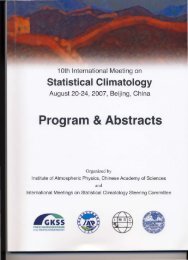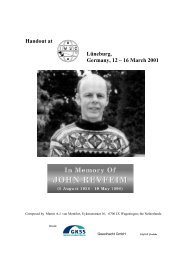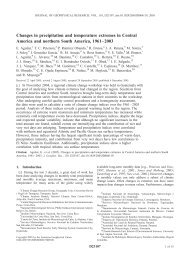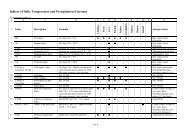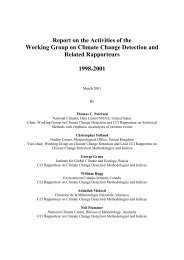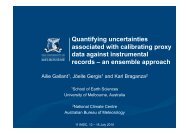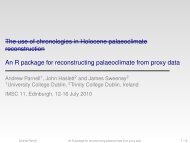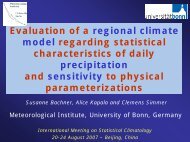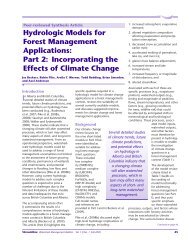- Page 2 and 3:
Bus map of city centre
- Page 4 and 5:
Edinburgh Centre to Pollock Halls A
- Page 7 and 8: Tips and advice for travelling in E
- Page 9 and 10: Information for Presenters: for pos
- Page 11 and 12: 11 IMSC Session Program 11 IMSC Ses
- Page 13 and 14: 11 IMSC Session Program Monday, Jul
- Page 15 and 16: 11 IMSC Session Program 15:15 - 15:
- Page 17 and 18: 11 IMSC Session Program 17:15 - 17:
- Page 19 and 20: 11 IMSC Session Program 12:00 - 13:
- Page 21 and 22: 11 IMSC Session Program 14:45 - 15:
- Page 23 and 24: 11 IMSC Session Program 16:30 - 16:
- Page 25 and 26: 11 IMSC Session Program 13:30 - 13:
- Page 27 and 28: 11 IMSC Session Program 16:00 - 16:
- Page 29 and 30: 11 IMSC Session Program Thursday, J
- Page 31 and 32: 11 IMSC Session Program 14:30 - 14:
- Page 33 and 34: 11 IMSC Session Program Evaluation
- Page 35 and 36: 11 IMSC Session Program Friday, Jul
- Page 37 and 38: 11 IMSC Session Program 18. Markus
- Page 39 and 40: 11 IMSC Session Program 15:30 - 15:
- Page 41 and 42: 11 IMSC Session Program Are there l
- Page 43 and 44: 11 IMSC Session Program HOMER: A hi
- Page 45 and 46: 11 IMSC Session Program Softcore an
- Page 47 and 48: 11 IMSC Session Program Towards the
- Page 49 and 50: 11 IMSC Session Program Past sea le
- Page 51 and 52: 11 IMSC Session Program Vidal, J.-P
- Page 53 and 54: 11 IMSC Session Program precipitati
- Page 55 and 56: 11 IMSC Session Program Structural
- Page 57: 11 IMSC Session Program Modeling an
- Page 61 and 62: 11 IMSC Session Program Multi-model
- Page 63 and 64: 11 IMSC Session Program Climate var
- Page 65 and 66: 11 IMSC Session Program Reconstruct
- Page 67 and 68: 11 IMSC Session Program Variational
- Page 69 and 70: 11 IMSC Session Program Intercompar
- Page 71 and 72: 11 IMSC Session Program Gridding of
- Page 73 and 74: 11 IMSC Session Program Reconstruct
- Page 75 and 76: 11 IMSC Session Program A new algor
- Page 77 and 78: 11 IMSC Session Program Assessing c
- Page 79 and 80: 11 IMSC Session Program importance
- Page 81 and 82: 11 IMSC Session Program Changing th
- Page 83 and 84: 11 IMSC Session Program Probabilist
- Page 85 and 86: 11 IMSC Session Program Mechanistic
- Page 87 and 88: 11 IMSC Session Program Quantifying
- Page 89 and 90: 11 IMSC Session Program Deriving dy
- Page 91 and 92: 11 IMSC Session Program A new monso
- Page 93 and 94: 11 IMSC Session Program Extreme var
- Page 95 and 96: 11 IMSC Session Program Cai, W., A.
- Page 97 and 98: 11 IMSC Session Program Uncertainti
- Page 99 and 100: 11 IMSC Session Program How good do
- Page 101 and 102: 11 IMSC Session Program Bridging th
- Page 103 and 104: 11 IMSC Session Program Climate cha
- Page 105 and 106: 11 IMSC Session Program The Variati
- Page 107 and 108: 11 IMSC Session Program Calibrating
- Page 109 and 110:
11 IMSC Session Program Analysis of
- Page 111 and 112:
11 IMSC Session Program Statistical
- Page 113 and 114:
11 IMSC Session Program No title pr
- Page 115 and 116:
11 IMSC Session Program The survey
- Page 117 and 118:
11 IMSC Session Program Detecting s
- Page 119 and 120:
11 IMSC Session Program Measure-cor
- Page 121 and 122:
11 IMSC Session Program Trend evalu
- Page 123 and 124:
11 IMSC Session Program Methodologi
- Page 125 and 126:
11 IMSC Session Program Trends in d
- Page 127 and 128:
11 IMSC Session Program Assimilatio
- Page 129 and 130:
11 IMSC Session Program - monthly a
- Page 131 and 132:
11 IMSC Session Program Non-linear
- Page 133 and 134:
11 IMSC Session Program What can we
- Page 135 and 136:
11 IMSC Session Program Constructin
- Page 137 and 138:
11 IMSC Session Program An intercom
- Page 139 and 140:
11 IMSC Session Program Historical
- Page 141 and 142:
11 IMSC Session Program Variance-pr
- Page 143 and 144:
11 IMSC Session Program A Bayesian
- Page 145 and 146:
11 IMSC Session Program CORDEX: Dev
- Page 147 and 148:
11 IMSC Session Program Downscaling
- Page 149 and 150:
11 IMSC Session Program Constructin
- Page 151 and 152:
11 IMSC Session Program A functiona
- Page 153 and 154:
11 IMSC Session Program Downscaling
- Page 155 and 156:
11 IMSC Session Program Constructio
- Page 157 and 158:
11 IMSC Session Program Intercompar
- Page 159 and 160:
11 IMSC Session Program Detecting a
- Page 161 and 162:
11 IMSC Session Program New techniq
- Page 163 and 164:
11 IMSC Session Program detected wi
- Page 165 and 166:
11 IMSC Session Program New develop
- Page 167 and 168:
11 IMSC Session Program A change po
- Page 169 and 170:
11 IMSC Session Program The analysi
- Page 171 and 172:
11 IMSC Session Program Memory in c
- Page 173 and 174:
11 IMSC Session Program Blending an
- Page 175 and 176:
11 IMSC Session Program Bowen, A. a
- Page 177 and 178:
11 IMSC Session Program Statistical
- Page 179 and 180:
11 IMSC Session Program Vidal, J.-P
- Page 181 and 182:
11 IMSC Session Program Classificat
- Page 183 and 184:
11 IMSC Session Program Downscaling
- Page 185 and 186:
11 IMSC Session Program Impact of c
- Page 187 and 188:
11 IMSC Session Program Comparison
- Page 189 and 190:
11 IMSC Session Program When is a m
- Page 191 and 192:
11 IMSC Session Program Objective a
- Page 193 and 194:
11 IMSC Session Program Weighting o
- Page 195 and 196:
11 IMSC Session Program Are current
- Page 197 and 198:
11 IMSC Session Program Uncertainty
- Page 199 and 200:
11 IMSC Session Program Verifying e
- Page 201 and 202:
11 IMSC Session Program The metaver
- Page 203 and 204:
11 IMSC Session Program An intercom
- Page 205 and 206:
11 IMSC Session Program Use of hidd
- Page 207 and 208:
11 IMSC Session Program Analysis of
- Page 209 and 210:
11 IMSC Session Program Volcanoes a
- Page 211 and 212:
11 IMSC Session Program Statistical
- Page 213 and 214:
11 IMSC Session Program No title pr
- Page 215 and 216:
11 IMSC Session Program Intermitten
- Page 217 and 218:
11 IMSC Session Program Statistical
- Page 219 and 220:
11 IMSC Session Program No title pr
- Page 221 and 222:
11 IMSC Session Program Statistical
- Page 223 and 224:
11 IMSC Session Program Enhanced ev
- Page 225 and 226:
11 IMSC Session Program A comparati
- Page 227 and 228:
11 IMSC Session Program Wavelet and
- Page 229 and 230:
11 IMSC Session Program Understandi
- Page 231 and 232:
11 IMSC Session Program curve signa
- Page 233 and 234:
11 IMSC Session Program Novel advan
- Page 235 and 236:
11 IMSC Session Program Skill in la
- Page 237 and 238:
11 IMSC Session Program Evaluating
- Page 239 and 240:
11 IMSC Session Program for each mo
- Page 241 and 242:
11 IMSC Session Program Designing e
- Page 243 and 244:
11 IMSC Session Program Multi-model
- Page 245 and 246:
11 IMSC Session Program Using a per
- Page 247 and 248:
11 IMSC Session Program Present-day
- Page 249 and 250:
11 IMSC Session Program Model evalu
- Page 251 and 252:
11 IMSC Session Program Constrainin
- Page 253 and 254:
11 IMSC Session Program Forecast en
- Page 255 and 256:
11 IMSC Session Program How can RCM
- Page 257 and 258:
11 IMSC Session Program Extreme var
- Page 259 and 260:
11 IMSC Session Program Extreme val
- Page 261 and 262:
11 IMSC Session Program Detecting c
- Page 263 and 264:
11 IMSC Session Program Subsampling
- Page 265 and 266:
11 IMSC Session Program Predicting
- Page 267 and 268:
11 IMSC Session Program Detection o
- Page 269 and 270:
11 IMSC Session Program Statistical
- Page 271 and 272:
11 IMSC Session Program On the stat
- Page 273 and 274:
11 IMSC Session Program A relaxes B
- Page 275 and 276:
11 IMSC Session Program The limited
- Page 277 and 278:
11 IMSC Session Program Prediction
- Page 279 and 280:
11 IMSC Session Program Towards sys
- Page 281 and 282:
11 IMSC Session Program The MVL dia
- Page 283 and 284:
11 IMSC Session Program SVD on ICE
- Page 285 and 286:
11 IMSC Session Program Crossing cr
- Page 287 and 288:
11 IMSC Session Program Water resou
- Page 289 and 290:
11 IMSC Session Program The spread
- Page 291 and 292:
11 IMSC Session Program Analysis of
- Page 293 and 294:
11 IMSC Session Program Towards an
- Page 295 and 296:
11 IMSC Session Program Trends in E
- Page 297 and 298:
11 IMSC Session Program Climate cha
- Page 299 and 300:
11 IMSC Session Program Shift of se
- Page 301 and 302:
11 IMSC Session Program Implication
- Page 303 and 304:
11 IMSC Session Program Bottom-up v
- Page 305 and 306:
11 IMSC Session Program Attributing
- Page 307 and 308:
11 IMSC Session Program Monitoring
- Page 309 and 310:
11 IMSC Session Program Anthropogen
- Page 311 and 312:
11 IMSC Session Program Analysis of
- Page 313 and 314:
11 IMSC Session Program Variability
- Page 315 and 316:
11 IMSC Session Program Spatial pat
- Page 317 and 318:
11 IMSC Session Program An analysis
- Page 319 and 320:
11 IMSC Session Program Changes on
- Page 321 and 322:
11 IMSC Session Program Can gridded
- Page 323 and 324:
11 IMSC Session Program Estimating
- Page 325 and 326:
11 IMSC Session Program The limits
- Page 327 and 328:
11 IMSC Session Program Variability
- Page 329 and 330:
11 IMSC Session Program Nonparametr
- Page 331 and 332:
11 IMSC Session Program exception,
- Page 333 and 334:
11 IMSC Session Program Analysis of
- Page 335 and 336:
11 IMSC Session Program Change in t
- Page 337 and 338:
11 IMSC Session Program Statistical
- Page 339 and 340:
11 IMSC Session Program Comparison
- Page 341 and 342:
11 IMSC Session Program Storm activ
- Page 343 and 344:
11 IMSC Session Program Comparison
- Page 345 and 346:
11 IMSC Session Program Modelling e
- Page 347 and 348:
11 IMSC Session Program European we
- Page 349 and 350:
11 IMSC Session Program Regression
- Page 351 and 352:
11 IMSC Session Program 3 Keef, C.,
- Page 353 and 354:
11 IMSC Session Program New indices
- Page 355 and 356:
11 IMSC Session Program Sources of
- Page 357 and 358:
11 IMSC Session Program sites in th
- Page 359 and 360:
11 IMSC Session Program Communicati
- Page 361 and 362:
11 IMSC Session Program Detection a
- Page 363 and 364:
11 IMSC Session Program Comparing t
- Page 365 and 366:
11 IMSC Session Program Spatial cha
- Page 367 and 368:
11 IMSC Session Program Ocean heat
- Page 369 and 370:
11 IMSC Session Program Observation
- Page 371 and 372:
11 IMSC Session Program Multi-model


![final_program_abstracts[1]](https://img.yumpu.com/19102520/58/500x640/final-program-abstracts1.jpg)
